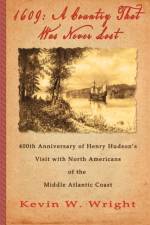- A Country That Was Never Lost - The 400th Anniversary of Henry Hudson's Visit with North Americans of the Middle Atlantic Coast
av Kevin W. Wright
299,-
Profit in silk and spices lured them into Arctic straits, but the chilling reality of the Little Ice Age blocked their passage. And so Henry Hudson and his mutinous crew turned westward armed with vague charts and supposed sightings of the Indian Ocean across a narrow sandy isthmus. Upon their arrival, crowds of curious Manhattans greeted them in canoes made from tree trunks. Dressed in animal skins and mantles woven of turkey feathers, they offered corn, beans, oysters, tobacco, hemp, grapes and pumpkins in trade for cloth, metal tools and trinkets. Mining contemporary sources, historian Kevin W. Wright has carefully reconstructed the native world that Henry Hudson encountered during his fateful voyage of 1609. In so doing, he dispels the fog of nineteenth and twentieth century myths to rediscover the North Americans of the Middle Atlantic Coast. Describing their original homelands and culture in great detail, he brings the panorama of culturally diverse native societies to life. These were truly the First Americans, inclined to live "almost all equally free." Could their natural democracy lie at the heart of the American spirit? The Hudson Quadricentennial marks the birth of the Dutch colony of New Netherland upon the Hudson and Delaware Rivers and the dawn of history for Delaware, New Jersey, Pennsylvania, New York and Connecticut. But as early as 1656, Dutch commentator Adriæn van der Donck wondered how Christopher Columbus or Amerigo Vespucci could have discovered "a country that was never lost?" Through these pages readers step back in time for a visit with ancient Algonquian and Iroquoian communities of Native Americans, including the original Manhattans, the Minisinks of Bachom's Country, the Lenape of the Schuylkill estuary, the Mahicans, Susquehannocks, Mohawks and others whose names have been lost in the mists of time. "1609: A Country That Was Never Lost" includes a bibliography, extensive end notes, and a very comprehensive index. It is destined to become a classic resource for anyone who enjoys Native American culture and history, especially in the New Jersey and New York areas.

